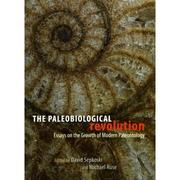| Listing 1 - 2 of 2 |
Sort by
|

ISBN: 1282426907 9786612426902 0226748596 9780226748597 0226748618 9780226748610 9781282426900 661242690X Year: 2009 Publisher: Chicago University of Chicago Press
Abstract | Keywords | Export | Availability | Bookmark
 Loading...
Loading...Choose an application
- Reference Manager
- EndNote
- RefWorks (Direct export to RefWorks)
The Paleobiological Revolution chronicles the incredible ascendance of the once-maligned science of paleontology to the vanguard of a field. With the establishment of the modern synthesis in the 1940s and the pioneering work of George Gaylord Simpson, Ernst Mayr, and Theodosius Dobzhansky, as well as the subsequent efforts of Stephen Jay Gould, David Raup, and James Valentine, paleontology became embedded in biology and emerged as paleobiology, a first-rate discipline central to evolutionary studies. Pairing contributions from some of the leading actors of the transformation with overviews from historians and philosophers of science, the essays here capture the excitement of the seismic changes in the discipline. In so doing, David Sepkoski and Michael Ruse harness the energy of the past to call for further study of the conceptual development of modern paleobiology.
Evolutionary paleobiology. --- Paleobiology. --- Paleontology. --- Fossilogy --- Fossilology --- Palaeontology --- Paleontology, Zoological --- Paleozoology --- Historical geology --- Zoology --- Fossils --- Prehistoric animals in motion pictures --- Palaeobiology --- Biology --- Paleontology --- Evolutionary palaeobiology --- Evolution (Biology) --- Paleobiology --- paleontology, paleobiology, fossils, james valentine, david raup, stephen jay gould, theodosius dobzhansky, ernst mayr, george gaylord simpson, early paleozoic, biogeography, conodont anatomy, vertebrates, hominids, dinosaurs, speciation, punctuated equilibria, unified evolutionary theory, reg sprigg, australia, paleoecology, community evolution, nonfiction, science.
Book
ISBN: 0691226709 9780691226705 Year: 2021 Publisher: Princeton ; Oxford : Princeton University Press,
Abstract | Keywords | Export | Availability | Bookmark
 Loading...
Loading...Choose an application
- Reference Manager
- EndNote
- RefWorks (Direct export to RefWorks)
"A provocative and timely case for how the science of genetics can help create a more just and equal society. In recent years, scientists like Kathryn Paige Harden have shown that DNA makes us different, in our personalities and in our health-and in ways that matter for educational and economic success in our current society. In The Genetic Lottery, Harden introduces readers to the latest genetic science, dismantling dangerous ideas about racial superiority and challenging us to grapple with what equality really means in a world where people are born different. Weaving together personal stories with scientific evidence, Harden shows why our refusal to recognize the power of DNA perpetuates the myth of meritocracy, and argues that we must acknowledge the role of genetic luck if we are ever to create a fair society.Reclaiming genetic science from the legacy of eugenics, this groundbreaking book offers a bold new vision of society where everyone thrives, regardless of how one fares in the genetic lottery"--
Genetics --- Social aspects. --- Academic achievement. --- Adolescence. --- Alcoholism. --- Allele. --- Americans. --- Association for Psychological Science. --- Autism. --- Behavior. --- Behavioural genetics. --- Bioethics. --- Biology. --- Causal inference. --- Chromosome. --- Cookbook. --- Deaf culture. --- Developmental psychology. --- Economic inequality. --- Education. --- Educational attainment. --- Educational inequality. --- Effect size. --- Environmental factor. --- Equal opportunity. --- Equality of outcome. --- Estimation. --- Eugenics. --- Experiment. --- Explanation. --- Eye color. --- Genetic association. --- Genetic diversity. --- Geneticist. --- Genetics. --- Genome-wide association study. --- Genomics. --- Genotype. --- Grandparent. --- Hearing loss. --- Heredity. --- Heritability. --- Human behavior. --- Ideology. --- Income. --- Inference. --- Inferiority complex. --- Ingredient. --- Institution. --- Insurance. --- Intellectual disability. --- Level of analysis. --- Make A Difference. --- Measurement. --- Mental disorder. --- Meritocracy. --- Meta-analysis. --- Moral responsibility. --- My Child. --- Nature versus nurture. --- Obesity. --- On Intelligence. --- Oppression. --- Pessimism. --- Phenotype. --- Philosopher. --- Polygenic score. --- Prediction. --- Princeton University Press. --- Probability. --- Protein. --- Psychologist. --- Psychology. --- Race (human categorization). --- Racism. --- Result. --- Richard Lewontin. --- Russell Sage Foundation. --- Schizophrenia. --- Scientist. --- Sexism. --- Sibling. --- Social class. --- Social inequality. --- Social science. --- Social status. --- Socioeconomic status. --- Sociology. --- Sperm. --- Standardized test. --- Statistic. --- Suggestion. --- Superiority (short story). --- Symptom. --- Technology. --- The Bell Curve. --- The Philosopher. --- Theodosius Dobzhansky. --- Twin study. --- Twin. --- Underclass. --- Wealth.
| Listing 1 - 2 of 2 |
Sort by
|

 Search
Search Feedback
Feedback About UniCat
About UniCat  Help
Help News
News